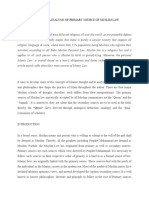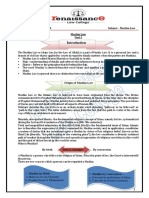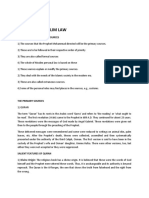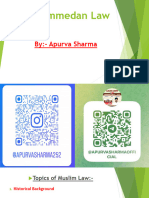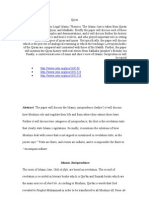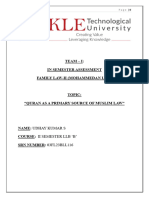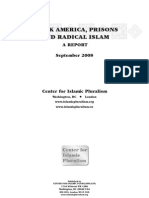What Does Islam Say About Sources of Islamic Law?
What Does Islam Say About Sources of Islamic Law?
Uploaded by
areebsiddiqueCopyright:
Available Formats
What Does Islam Say About Sources of Islamic Law?
What Does Islam Say About Sources of Islamic Law?
Uploaded by
areebsiddiqueOriginal Title
Copyright
Available Formats
Share this document
Did you find this document useful?
Is this content inappropriate?
Copyright:
Available Formats
What Does Islam Say About Sources of Islamic Law?
What Does Islam Say About Sources of Islamic Law?
Uploaded by
areebsiddiqueCopyright:
Available Formats
Sources of Islamic Law
ISLAMIC LAWS
What Does Islam Say about Sources of Islamic Law?
Sources of Islamic law
Various sources of Islamic law are used by Islamic jurisprudence to elucidate the Shariah, the
body of Islamic law. The primary sources, accepted universally by all Muslims, are the Qur'an and
Sunnah. The Qur'an is the holy scripture of Islam, believed by Muslims to be the direct and
unaltered word of Allah. The Sunnah consists of the religious actions and quotations of the
Islamic Prophet Muhammad and narrated through his Companions and Shia Imams. However,
some schools of jurisprudence use different methods to judge the source's level of authenticity.
As Islamic regulations stated in the primary sources do not explicitly deal with every conceivable
eventuality, jurisprudence must refer to resources and authentic documents to find the correct
course of action. According to Sunni schools of law, secondary sources of Islamic law are
consensus among Muslims jurists, analogical deduction, al-Ra'y; independent reasoning, benefit
for the Community and Custom. Hanafi school frequently relies on analogical deduction and
independent reasoning, and Maliki and Hanbali generally use the Hadith instead. Shafi'i school
uses Sunnah more than Hanafi and analogy more than two others. Among Shia, Usuli school of
Ja'fari jurisprudence uses four sources, which are Qur'an, Sunnah, consensus and aql. They use
Ijma under special conditions and rely on aql (intellect) to find general principles based on the
Qur'an and Sunnah, and use usul al-fiqh as methodology to interpret the Qur'an and Sunnah in
different circumstances, and Akhbari Jafaris rely more on Hadith and reject ijtihad. According to
Momin, despite considerable differences in the principles of jurisprudence between Shia and the
four Sunni schools of law, there are fewer differences in the practical application of jurisprudence
to ritual observances and social transactions.
Primary sources
The Qur'an: {2: 2-3; 4: 105}
Muslims believe the Qur'an to be the direct words of Allah, as revealed to and transmitted by the
Prophet Muhammad. All sources of Islamic law must be in essential agreement with the Qur'an,
the most fundamental source of Islamic knowledge. When the Qur'an itself does not speak
directly or in detail about a certain subject, Muslims only then turn to alternative sources of
Islamic law. This is the first and most important source of Islamic law. Believed to be the direct
word of God as revealed to Muhammad through angel Gabriel in Mecca and Medina, the scripture
specifies the moral, philosophical, social, political and economic basis on which a society should
be constructed. The verses revealed in Mecca deal with philosophical and theological issues,
whereas those revealed in Medina are concerned with socio-economic laws. The Qur'an was
written and preserved during the life of Muhammad, and compiled soon after his death.
Muslim jurists agree that the Qur'an in its entirety is not a legal code (used in the modern sense);
rather its purpose is to lay down a way of life which regulates man's relationship with others and
God. The verses of the Qur'an are categorized into three fields: "science of speculative
theology", "ethical principles" and "rules of human conduct". The third category is directly
concerned with Islamic legal matters which contain about five hundred verses or one thirteenth
of it. The task of interpreting the Qur'an has led to various opinions and judgments. The
interpretations of the verses by Muhammad's companions are considered the most authentic,
since they knew why, where and on what occasion each verse was revealed.
About Personal Behaviour 5:90; Financial matters2:275; Crimes Life for life Maida; Make Law
4:59.
The Sunnah: {4:80; 68:4}
Sunnah is the traditions or known practices of the Prophet Muhammad, many of which have
been recorded in the volumes of Hadith literature. The resources include many things that he
said, did, or agreed to -- and he lived his life according to the Qur'an, putting the Qur'an into
practice in his own life. During his lifetime, the Prophet's family and companions observed him
and shared with others exactly what they had seen in his words and behaviors -- i.e. how he
performed ablutions, how he prayed, and how he performed many other acts of worship. People
also asked the Prophet directly for rulings on various matters, and he would pronounce his
judgment. All of these details were passed on and recorded, to be referred to in future legal
sohrwardypk@gmail.com
Page 1
Sources of Islamic Law
rulings. Many issues concerning personal conduct, community and family relations, political
matters, etc. were addressed during the time of the Prophet, decided by him, and recorded. The
Sunnah can thus clarify details of what is stated generally in the Qur'an.
The Sunnah is the next important source, and is commonly defined as "the traditions and
customs of Muhammad" or "the words, actions and silent assertions of him". It includes the
everyday sayings and utterances of Muhammad, his acts, his tacit consent, and
acknowledgments of statements and activities. Justification for using the Sunnah as a source of
law can be found in the Qur'an.
The Qur'an commands Muslims to follow Muhammad. During his lifetime, Muhammad made it
clear that his traditions (along with the Qur'an) should be followed after his death. The
overwhelming majority of Muslims consider the Sunnah to be essential supplements to and
clarifications of the Qur'an. In Islamic jurisprudence, the Qur'an contains many rules for the
behavior expected of Muslims but there are no specific Qur'anic rules on many religious and
practical matters. Muslims believe that they can look at the way of life, or Sunnah, of
Muhammad and his companions to discover what to imitate and what to avoid.
Much of the Sunnah is recorded in the Hadith. Initially, Muhammad had instructed his followers
not to write down his acts, so they may not confuse it with the Qur'an. However, he did ask his
followers to disseminate his sayings orally. As long as he was alive, any doubtful record could be
confirmed as true or false by simply asking him. His death, however, gave rise to confusion over
Muhammad's conduct. Thus the Hadith were established. Due to problems of authenticity, the
science of Hadith (Arabic: `Ulum al-Hadith) is established. It is a method of textual criticism
developed by early Muslim scholars in determining the veracity of reports attributed to
Muhammad. This is achieved by analyzing the text of the report, the scale of the report's
transmission, the routes through which the report was transmitted, and the individual narrators
involved in its transmission. On the basis of these criteria, various Hadith classifications
developed.
To establish the authenticity of a particular Hadith or report, it had to be checked by following
the chain of transmission (isnad). Based upon these criteria, the reliability (thiqt) of the
transmitter is assessed. Examples of biographical dictionaries include Ibn Hajar al-Asqalani
criteria,
Hadith
are
classified
into
three
categories:
1. Undubitable (mutawatir), which are very widely known, and backed up by numerous
references.
2. Widespread (mashhur), which are widely known, but backed up with few original references.
3. Isolated or Single (wahid), which are backed up by too few and often discontinuous references.
Secondary sources
All medieval Muslim jurists rejected arbitrary opinion, and instead developed various secondary
sources, also known as juristic principles or doctrines to follow in case the primary sources (i.e.
the Qur'an and Sunnah) are silent on the issue.
Ijma' (consensus):
{16:43 consulting knowledgeable; 4:59 charged with authority}
In situations when Muslims have not been able to find a specific legal ruling in the Qur'an or
Sunnah, the consensus of the community is sought (or at least the consensus of the legal
scholars within the community). The Prophet Muhammad once said that his community (i.e. the
Muslim community) would never agree on an error.
The Ijma, or consensus amongst Muslim jurists on a particular legal issue, constitutes the third
source of Islamic law. Muslim jurists provide many verses of the Qur'an that legitimize Ijma' as a
source of legislation. Muhammad himself said:
"My
followers
will
never
agree
upon
an
error
or
what
is
wrong",
"God's hand is with the entire community".
In history, it has been the most important factor in defining the meaning of the other sources
and thus in formulating the doctrine and practice of the Muslim community. This is so because
Ijma' represents the unanimous agreement of Muslims on a regulation or law at any given time.
There are various views on Ijma' among Muslims. Sunni jurists consider Ijma' as a source, in
matters of legislation, as important as the Qur'an and Sunnah. Shiite jurists, however, consider
Ijma' as source of secondary importance, and a source that is, unlike the Qur'an and Sunnah, not
free from error. Ijma' always used to refer to agreement reached in the past, either remote or
near.
sohrwardypk@gmail.com
Page 2
Sources of Islamic Law
Ijma
Ijma
Ijma
Ijma
of
of
of
of
the
the
the
the
Companions
Imams
Scholars
Local Muslim Community (Mashwara)
Qiyas (analogy):
Then take admonition O you with insight. Al Hashr 59:2
In cases when something needs a legal ruling, but has not been clearly addressed in the other
sources, judges may use analogy, reasoning, and legal precedent to decide new case law. This is
often the case when a general principle can be applied to new situations. (The article Smoking is
forbidden in Islam is an example of this process at work.)
Qiyas or analogical deduction is the fourth source of Shariah for the Sunni jurisprudence. Shiites
do not accept Qiyas, but replace it with reason (aql). Qiyas is the process of legal deduction
according to which the jurist, confronted with an unprecedented case, bases his or her argument
on the logic used in the Qur'an and Sunnah. Qiyas must not be based on arbitrary judgment, but
rather be firmly rooted in the primary sources.
Supporters of Qiyas will often point to passages in the Qur'an that describe an application of a
similar process by past Islamic communities. According to Hadith, Muhammad said: "Where there
is no revealed injunction, I will judge amongst you according to reason." Further, he extended
the right to reason to others. Finally, Qiyas is sanctioned by the Ijma, or consensus, amongst
Muhammad's companions.
The success and expansion of Islam brought it into contact with different cultures, societies and
traditions, such as those of Byzantines and Persians. With such contact, new problems emerged
for Islamic law to tackle.
Moreover, there was a significant distance between Medina, the Islamic capital, and the Muslims
on the periphery on the Islamic state. Thus far off jurists had to find novel Islamic solutions
without the close supervision of the hub of Islamic law (back in Medina). During the Umayyad
dynasty, the concept of Qiyas was abused by the rulers. The Abbasids, who succeeded the
Umayyad, defined it more strictly, in an attempt to apply it more consistently.
The general principle behind the process of Qiyas is based on the understanding that every legal
injunction guarantees a beneficial and welfare satisfying objective. Thus, if the cause of an
injunction can be deduced from the primary sources, then analogical deduction can be applied to
cases with similar causes. For example, wine is prohibited in Islam because of its intoxicating
property. Thus Qiyas leads to the conclusion that all intoxicants are forbidden.
Qualifications of a Mujtahid
A Mujtahid is an Islamic scholar, competent to interpret divine law (Shariah) in practical
situations using ijtihad (independent thought). In some, but not all, Islamic traditions, a Mujtahid
can specialize in a branch of Shariah - economic or family law for example.
The qualifications for a Mujtahid were set out by Abul Husain al-Basri (died 467 AH / 1083 CE) in
al Mutamad fi Usul al-Fiqh and accepted by later Sunni scholars, including al-Ghazali. These
qualifications can be summed up as (i) an understanding of the objectives of the Shariah, and (ii)
a knowledge of its sources and methods of deduction. They include:
a competence in the Arabic language which allows him/her to have a correct
understanding of the Quran . That is, s/he must appreciate the subtleties of the language
so as to be able to draw accurate deductions from the clear and un-crooked Arabic of
this infallible source, and that of the Sunnah.
An adequate knowledge of the Meccan and Medinese contents of the Quran, the events
surrounding their revelation and the incidences of abrogation (suspending or repealing a
ruling) revealed therein. S/he must be fully acquainted with its legal contents (the ayah
al-ahkam) - some 500 verses, according to al-Ghazali. S/he need not have a detailed
knowledge the narratives and parables, nor of the sections relating to the hereafter, but
s/he must be able to use these to infer a legal rule. S/he needs to be acquainted with all
the classical commentaries on the ayah al-ahkam, especially the views of the
Companions of the Prophet.
sohrwardypk@gmail.com
Page 3
Sources of Islamic Law
An adequate knowledge of the Sunnah, especially those related to his specialization. S/he
needs to know the relative reliability of the narrators of the Hadith, and be able to
distinguish between the reliable from the weak. S/he needs to have a thorough
knowledge of incidences of abrogation, distinguish between the general and specific, the
absolute and the qualified. One estimate (by Ahmad Ibn Hanbali) suggests that 1,200
Hadith need to be known.
s/he should be able to verify the consensus Ijma of the Companions of the Prophet, the
successors and the leading imams and mujahedeen of the past, especially with regard to
his/her specialization. Complementary to this, s/he should be familiar with the issues on
which there is no consensus.
S/he should have a thorough knowledge of the rules and procedures for reasoning by
analogy (Qiyas) so s/he can apply revealed law to an unprecedented case.
S/he should understand the revealed purposes of Shariah, which relate to "considerations
of public interest", including the Five Pillars protection of "life, religion, intellect, lineage"
and property. S/he should also understand the general maxims for the interpretation of
Shariah, which include the "removal of hardship", that "certainty must prevail over
doubt", and the achievement of a balance between unnecessary rigidity and too free an
interpretation.
S/he must practice what s/he preaches, that is s/he must be an upright person whose
judgement people can trust. Some Islamic traditions consider that these high conditions
cannot be met by anyone nowadays, while for others, they are met in every generation.
What is a "Fatwa"?
Definition: A fatwa is an Islamic religious ruling, a scholarly opinion on a matter of Islamic law.
A fatwa is issued by a recognized religious authority in Islam. But since there is no hierarchical
priesthood or anything of the sort in Islam, a fatwa is not necessarily "binding" on the faithful.
The people who pronounce these rulings are supposed to be knowledgeable, and base their
rulings in knowledge and wisdom. They need to supply the evidence from Islamic sources for
their opinions, and it is not uncommon for scholars to come to different conclusions regarding
the same issue. As Muslims, we look at the opinion, the reputation of the person giving it, the
evidence given to support it, and then decide whether to follow it or not. When there are
conflicting opinions issued by different scholars, we compare the evidence and then choose the
opinion
to
which
our
God-given
conscience
guides
us.
Example: Some scholars have issued a fatwa that smoking cigarettes are forbidden in Islam.
Assignment:
Q. (a) How are the Quran, Hadith and Ijma used together in Islamic legal thinking?
[10]
(b) Why do some legal scholars reject the use of analogy (Qiyas)?
[4]
sohrwardypk@gmail.com
Page 4
Sources of Islamic Law
WORK SHEET ON SOURCES OF ISLAMIC LAW
Date:
Class/Sec:
Name(s):
Subject:
ISLAMIYAT-2058
Define SOIL {3 minutes}.
[2]
How are these sources linked to one another? {4 minutes]
[3]
What methods are applicable to carryout Ijma & Qiyas? {8 minutes]
[5]
sohrwardypk@gmail.com
Page 5
Sources of Islamic Law
Max. Marks: _____ Marks Obtained: ______ Level/Grade:______ T. Sign: ___________________
sohrwardypk@gmail.com
Page 6
You might also like
- The Value of TimeDocument97 pagesThe Value of Timearrukin1100% (2)
- 4 Schools of Thought in IslamDocument15 pages4 Schools of Thought in IslamMadison Sheena86% (14)
- Add Math IGCSE Topical Test - IntegrationDocument3 pagesAdd Math IGCSE Topical Test - IntegrationMelinda Tiong100% (3)
- Hajj Umrah Ziyarah Guide - Mufti Faraz Al MahmudiDocument138 pagesHajj Umrah Ziyarah Guide - Mufti Faraz Al MahmudimahashafiqueNo ratings yet
- ThesisDocument306 pagesThesiskacatesicNo ratings yet
- Sources of Islamic Law Zee 1Document14 pagesSources of Islamic Law Zee 1Zeeshan AhmadNo ratings yet
- Fiqh or Islamic Jurisprudence (: Arabic Sharia Fatwas Islamic Islamic Law Sunni Islam Hanafi Maliki Shafi'i HanbaliDocument3 pagesFiqh or Islamic Jurisprudence (: Arabic Sharia Fatwas Islamic Islamic Law Sunni Islam Hanafi Maliki Shafi'i HanbaliThe quran InstituteNo ratings yet
- Primary Sources Holy QuranDocument16 pagesPrimary Sources Holy QuranKhan FahadNo ratings yet
- Nature and Sources of Muslim LawDocument9 pagesNature and Sources of Muslim LawSheikh SayedainNo ratings yet
- Sources of Sharia LawDocument15 pagesSources of Sharia LawAmaaan KhanNo ratings yet
- Stages of Islamice LegislatureDocument25 pagesStages of Islamice LegislatureKunwer TaibaNo ratings yet
- Quran and SunnahDocument9 pagesQuran and SunnahRabia AftabNo ratings yet
- Dr. Ram Manohar Lohiya National Law University: Project ODocument10 pagesDr. Ram Manohar Lohiya National Law University: Project OYoYoAviNo ratings yet
- Sources of Muslim LawDocument5 pagesSources of Muslim Lawparijat_96427211100% (1)
- Sources of Sharia - Wikipedia PDFDocument50 pagesSources of Sharia - Wikipedia PDFRajib SharNo ratings yet
- Conceptual Analysis of Primary Source of Muslim LawDocument7 pagesConceptual Analysis of Primary Source of Muslim LawRishika SinghNo ratings yet
- Sources of Islamic LawDocument10 pagesSources of Islamic LawJahidul Islam Mahin100% (3)
- Sources of Muslim Law - NotesDocument11 pagesSources of Muslim Law - NotesLata SinghNo ratings yet
- Sources of Muslim LawDocument5 pagesSources of Muslim LawGaurav FirodiyaNo ratings yet
- Muslim Law Combined NotesDocument298 pagesMuslim Law Combined NotesPuskarNo ratings yet
- Muslim LawDocument67 pagesMuslim LawRaghav SodhiNo ratings yet
- Sources of LawDocument28 pagesSources of LawMS.MOINNo ratings yet
- Izlami InsuranceDocument186 pagesIzlami InsuranceKansohmi KansNo ratings yet
- Sources of Islamic LawDocument22 pagesSources of Islamic LawFahim KhanNo ratings yet
- Sources of Muslim LawDocument9 pagesSources of Muslim Lawnimisha259No ratings yet
- Family Law IIDocument14 pagesFamily Law IITadap MallingNo ratings yet
- Sources of Muslim LawDocument9 pagesSources of Muslim LawMoiz BharmalNo ratings yet
- IntroductionDocument4 pagesIntroductionLoreah Thabiso MokhutheNo ratings yet
- Title Sources of ShaariahDocument8 pagesTitle Sources of Shaariahfa22-bph-010No ratings yet
- Sources of Western and Islamic Law by Asif DaadDocument2 pagesSources of Western and Islamic Law by Asif DaadShahzad NigoriNo ratings yet
- HB and Origin of Islamic Law Who Is A Muslim and SourcesDocument7 pagesHB and Origin of Islamic Law Who Is A Muslim and SourcesTejas KirwaiwaleNo ratings yet
- Source of Muslim LawDocument5 pagesSource of Muslim Lawkani sreeNo ratings yet
- Soban IslDocument6 pagesSoban IslM SaadNo ratings yet
- Saad IslDocument6 pagesSaad IslM SaadNo ratings yet
- Family Law-2 Assignment (A)Document7 pagesFamily Law-2 Assignment (A)anandgopu2No ratings yet
- Muslim Law RR1 - 1707977433 1Document70 pagesMuslim Law RR1 - 1707977433 1jjsunshine147No ratings yet
- Abstract: The Paper Will Discuss The Islamic Jurisprudence (Tashre) It Will DiscussDocument7 pagesAbstract: The Paper Will Discuss The Islamic Jurisprudence (Tashre) It Will DiscussBahaa_Stephano_6090No ratings yet
- 3 Sources of Islamic LawDocument5 pages3 Sources of Islamic LawZeeshan KhatriNo ratings yet
- Muslim Law PDFDocument67 pagesMuslim Law PDFAnubhav NiranjanNo ratings yet
- Muslim Law Lecture 1Document10 pagesMuslim Law Lecture 1iamadilskNo ratings yet
- Schools of Islamic LawDocument10 pagesSchools of Islamic LawMohd AqibNo ratings yet
- A Case For A Muslim-Specific Burial Ground in Brighton & Hove)Document6 pagesA Case For A Muslim-Specific Burial Ground in Brighton & Hove)uthmanNo ratings yet
- Sources of LawDocument6 pagesSources of LawsjohnjebaduraiNo ratings yet
- Sources of Muslim LawDocument7 pagesSources of Muslim LawSheetal ParakhNo ratings yet
- Study Notes On Muslim LawDocument59 pagesStudy Notes On Muslim LawAdnan RezaNo ratings yet
- Muslim Political ThoughtDocument8 pagesMuslim Political ThoughtAsif AfridiNo ratings yet
- Sources of Muslim LawDocument8 pagesSources of Muslim LawArya VermaNo ratings yet
- The Five Pillars of IslamDocument4 pagesThe Five Pillars of IslamGene AdionNo ratings yet
- Schools of Muslim Law Lecture - 3Document24 pagesSchools of Muslim Law Lecture - 3Rakesh Chandra GhoshNo ratings yet
- Muslim Notes Final OkDocument95 pagesMuslim Notes Final OkMohit SagarNo ratings yet
- Lecture 4Document12 pagesLecture 4M Shahdeen RafiNo ratings yet
- The Foundations of IslamDocument6 pagesThe Foundations of Islamkiran samNo ratings yet
- Islamic LawDocument12 pagesIslamic LawHamzu KhanNo ratings yet
- Family Law 2 Assignment Anand Kishor 015Document10 pagesFamily Law 2 Assignment Anand Kishor 015anandgopu2No ratings yet
- Muslim Law - Quran Has A Primary SourceDocument10 pagesMuslim Law - Quran Has A Primary Sourceuday shankarNo ratings yet
- Shariah Laws: Shariah Laws:: Holy Quran Holy QuranDocument4 pagesShariah Laws: Shariah Laws:: Holy Quran Holy QuraniohxnNo ratings yet
- Notes Fam Law - IDocument7 pagesNotes Fam Law - Ibhavika.nagpal000No ratings yet
- IJMA and Qiyas and Relevant Questions From Past PapersDocument13 pagesIJMA and Qiyas and Relevant Questions From Past PapersMuhammad AliNo ratings yet
- Sharia LawDocument31 pagesSharia LawChristian Roque100% (1)
- Sources of LawDocument1 pageSources of LawZÅîb MëýmÖñNo ratings yet
- Muslim Family Law in India (Part 1: Sources of Law, Marriage, Divorce, Maintenance, Guardianship)From EverandMuslim Family Law in India (Part 1: Sources of Law, Marriage, Divorce, Maintenance, Guardianship)Rating: 4 out of 5 stars4/5 (6)
- The "Forty Hadiths" of Imam al-Nawawi: A New Translation with Accompanying Commentary and JurisprudenceFrom EverandThe "Forty Hadiths" of Imam al-Nawawi: A New Translation with Accompanying Commentary and JurisprudenceNo ratings yet
- Making sense of islamic law: With a glance at its appliances to women and State AffairsFrom EverandMaking sense of islamic law: With a glance at its appliances to women and State AffairsNo ratings yet
- Tangent Lines: y X X y XDocument2 pagesTangent Lines: y X X y XareebsiddiqueNo ratings yet
- 7 Mark Question ListDocument1 page7 Mark Question ListareebsiddiqueNo ratings yet
- XIDocument42 pagesXIareebsiddiqueNo ratings yet
- XiiDocument40 pagesXiiareebsiddiqueNo ratings yet
- Bs SyllabusDocument25 pagesBs Syllabuskuku129No ratings yet
- Why Was Carbon 12 Was Taken As Standard in Defining MoleDocument5 pagesWhy Was Carbon 12 Was Taken As Standard in Defining Moleareebsiddique100% (1)
- 3248 s11 Ms 1Document5 pages3248 s11 Ms 1areebsiddiqueNo ratings yet
- 4024 s12 Ms 12Document5 pages4024 s12 Ms 12Hammad AhmedNo ratings yet
- 0580 RevisionDocument118 pages0580 RevisionSrinivas Venkataraman100% (1)
- Atp PhysicsDocument5 pagesAtp PhysicsareebsiddiqueNo ratings yet
- Hazrat Uthman: Khs Islamiyat Notes SeriesDocument5 pagesHazrat Uthman: Khs Islamiyat Notes SeriesareebsiddiqueNo ratings yet
- Allah With MankindDocument1 pageAllah With MankindareebsiddiqueNo ratings yet
- Finding The Range of Quadratic FunctionsDocument2 pagesFinding The Range of Quadratic FunctionsareebsiddiqueNo ratings yet
- 3.1 HZ Abu Bakr RZDocument9 pages3.1 HZ Abu Bakr RZareebsiddiqueNo ratings yet
- Face Book: Khalid Hameed Students Galaxy: Khs Islamiyat Notes Series Chap 2 P2Document9 pagesFace Book: Khalid Hameed Students Galaxy: Khs Islamiyat Notes Series Chap 2 P2areebsiddiqueNo ratings yet
- Khs Islamiyat Ol Notes Series Ahadith 11-15 Hadith # 11: Checklist: A) Belief StrengthenedDocument3 pagesKhs Islamiyat Ol Notes Series Ahadith 11-15 Hadith # 11: Checklist: A) Belief Strengthenedareebsiddique100% (2)
- Topic # 2: History, Importance & Compilation of Holy Qur'AnDocument13 pagesTopic # 2: History, Importance & Compilation of Holy Qur'AnareebsiddiqueNo ratings yet
- 1 Science of RijalDocument37 pages1 Science of Rijalapi-314732227100% (1)
- Notes For PowerpointDocument4 pagesNotes For PowerpointSomethingUser11No ratings yet
- CIPPrisonStudyforRelease: PRISONS AND RADICAL ISLAMDocument44 pagesCIPPrisonStudyforRelease: PRISONS AND RADICAL ISLAMIcas PhilsNo ratings yet
- Introduction To HadeethDocument18 pagesIntroduction To HadeethSamer EhabNo ratings yet
- Understanding Islam, Islamism, and Islamic FeminismDocument7 pagesUnderstanding Islam, Islamism, and Islamic FeminismPablo BlackNo ratings yet
- SalatDocument31 pagesSalatManimekala ViswanathanNo ratings yet
- Maajid Nawaz Mi6 and KhudiDocument8 pagesMaajid Nawaz Mi6 and KhudiShahid KhanNo ratings yet
- Azerbaijan: in The Shadow of DictatorshipDocument48 pagesAzerbaijan: in The Shadow of Dictatorshiparzu_geybullayevaNo ratings yet
- Bay Al InahDocument12 pagesBay Al InahAyu SetzianiNo ratings yet
- (Middle East Today) Asma Afsaruddin (Eds.) - Islam, The State, and Political Authority - Medieval Issues and Modern Concerns (2011, Palgrave Macmillan US) PDFDocument259 pages(Middle East Today) Asma Afsaruddin (Eds.) - Islam, The State, and Political Authority - Medieval Issues and Modern Concerns (2011, Palgrave Macmillan US) PDFJoky Satria100% (1)
- Hajj Along With FalaheeDocument283 pagesHajj Along With FalaheeMUFTI FARID AHMED KAVINo ratings yet
- Raf'-ul-Yadain: This Is Also The MâlikiDocument4 pagesRaf'-ul-Yadain: This Is Also The MâlikiMohammed Abdul KhaderNo ratings yet
- Slavoj Zizek. The Situation Is CatastrophicDocument10 pagesSlavoj Zizek. The Situation Is CatastrophicemrahcnrNo ratings yet
- Do I Need To Follow A Madhab - SajaadDocument6 pagesDo I Need To Follow A Madhab - SajaadMystic AamirNo ratings yet
- Deadly Education - Evaluating Which Universities Are Attractive To International TerroristsDocument106 pagesDeadly Education - Evaluating Which Universities Are Attractive To International TerroristsKristan J. WheatonNo ratings yet
- Democracy and Political Islam in BangladDocument22 pagesDemocracy and Political Islam in BangladHOSSAINAHMED BANGLADESHNo ratings yet
- En 22 Majmoo AlFatawa IbnBazDocument316 pagesEn 22 Majmoo AlFatawa IbnBazIslamic Reserch Center (IRC)No ratings yet
- Sifat As Salah WorkbookDocument47 pagesSifat As Salah WorkbookHafiza Abdullah100% (1)
- How To Perform The Tahajjud PrayerDocument13 pagesHow To Perform The Tahajjud PrayerAras Sinsuat100% (1)
- Publisher Makes Tawbah (Word File)Document10 pagesPublisher Makes Tawbah (Word File)Abu HibbaNo ratings yet
- Jihadism On Its Own Terms: Understanding A MovementDocument16 pagesJihadism On Its Own Terms: Understanding A MovementHoover Institution100% (1)
- Fiqh 6 - The Chapter of IstinjaDocument10 pagesFiqh 6 - The Chapter of IstinjaNoor-uz-Zamaan AcademyNo ratings yet
- Reading Comprehension - Earth DayDocument7 pagesReading Comprehension - Earth DayCindy CorpNo ratings yet
- Fountainhead of Jihad The Haqqani Nexus 1973 2012Document254 pagesFountainhead of Jihad The Haqqani Nexus 1973 2012ﹺ ﹺ ﹺ ﹺNo ratings yet
- Zabiha ReloadedDocument3 pagesZabiha ReloadedKm JmlNo ratings yet
- Boko Haram and Its ImpactDocument13 pagesBoko Haram and Its ImpactWestminster InstituteNo ratings yet
- Funk & Wagnalls New World Encyclopedia 1p)Document6 pagesFunk & Wagnalls New World Encyclopedia 1p)api-320203300No ratings yet















